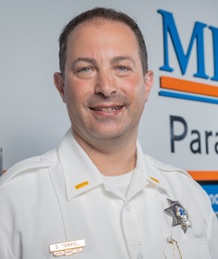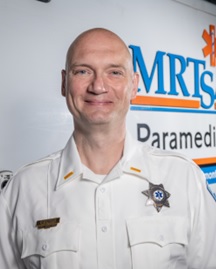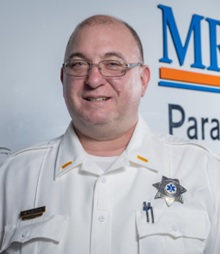Our Providers
Our Management
David Terkel– Acting Chief of Operations (He/Him/His)
David was made acting Chief of Operations on 2/17/2024. He started as a volunteer EMT with MRTSA in 1995 and has advanced through the organization over the past 27 years. In April of 2020, David was promoted to the rank of Lieutenant where he handles daily shift operations, community outreach and education. David serves as the special teams’ liaison. David previously served as a tactical paramedic on SHACOG CIRT and as a swift water technician for Allegheny County HMMR/Swift Water Rescue. Most recently, he took on the responsibility of raising and training MRTSA’s therapy dog CJ, who lives with him and his family in Mt. Lebanon.

Gerry Barnett, MS – Director of Administration (She/Her/Hers)
Gerry is originally from Pittsburgh, PA and currently resides in Gibsonia, PA. Gerry received her bachelor's from University of Maryland, University College in Management Studies, and master’s in Human Services from Capella University. Gerry was a Practice Administrator for 13 years with a clinic that provided speech, physical and occupational therapy to all age groups with neurological issues.

Bob Kmetz, Paramedic – Lieutenant, Clinical Affairs and Education (He/Him/His)
Robert began his journey in EMS at the age of 16 as a volunteer First Responder then EMT for North Braddock EMS. Wanting to be associated with a highly respected EMS service, he sought and gained employment at Medical Rescue Team South Authority as an EMT in 1994. He was promoted to paramedic in 1998 and subsequently served as a paramedic preceptor for the St. Clair medical command system. Through his career, he has had a strong interest in quality assurance, education, and safety. In March of 2020, he accepted a promotion to Lieutenant.

Bill Sukitch B.S., Paramedic – Lieutenant, Support Services (He/Him/His)
Bill has 30 years of experience as a paramedic and EMT. He started his career as an EMT volunteering with Wilkinsburg EMS in 1992 after attending the Center for Emergency Medicine’s EMT program. In 1995, he began his career with Medical Rescue Team South as an EMT and later was promoted to Paramedic after attending CCAC’s Paramedic program. Educated at both Duquesne University and Point Park University, Bill holds a bachelor’s in public administration. Bill serves as a Paramedic on the Allegheny County HMMR/Swift Water Rescue Team. Bill served honorably as a Navy corpsman during two tours to the Middle East in support of Operation Iraqi Freedom. Bill was promoted to Lieutenant in 2021 after serving 26 years as a field provider at MRTSA.

CJ, Aussiedoodle – Dog of Therapy
CJ is the newest 4-legged member of MRTSA. CJ started his training as a therapy/comfort dog in the spring of 2022. CJ lives with his handler, Lieutenant Terkel, and his family in Mt. Lebanon. CJ’s purpose is to provide emotional support MRTSA’s staff and other public safety partners. CJ will eventually assist with special teams such as Critical Incident Stress Management (CISM). CJ will be visiting those in need, to spread the message of mental health awareness and suicide prevention. In his free time, CJ enjoys chasing tennis balls, belly rubs, and some occasional counter surfing.

Provider Levels
EMS provider levels and scope of practice varies from state to state. All EMS providers in Pennsylvania must hold state certification. Many providers additionally hold national certification issued by the National Registry of Emergency Medical Technicians (NREMT)
The following providers are used in Pennsylvania.
EMR
Emergency Medical Responders have knowledge of lifesaving skills such as CPR, bleeding control and airway management. These courses are usually 56-70 hours in duration. You must be at least 16 years of age. You then certify by successfully completing the National Registry of EMTs exam which includes both a skills and written exam.
EMT
Emergency Medical Technicians have knowledge of lifesaving skills such as CPR, bleeding control, airway management, limited medications, treatment for medical and trauma emergencies, and ambulance operations. These courses are usually 150-200 hours in duration as well as a field component to treat and assess patients. You must be at least 16 years of age. You then certify by successfully completing the National Registry of EMTs exam which includes both a skills and written exam.
AEMT
Advanced Emergency Medical Technicians have knowledge of lifesaving skills such as CPR, bleeding control, some advanced airway management, IV’s, medication delivery, treatment for medical and trauma emergencies, and ambulance operations. AEMTs must already poses a certification as an EMT. These courses are an extra 300 hours in duration on top of EMT education with an additional 300 hours of field and hospital clinical components learning to treat and assess patients. You must be at least 18 years of age. You then certify by successfully completing the National Registry of EMTs exam which includes both a skills and written exam.
Paramedic
Paramedics have knowledge of lifesaving skills such as CPR, bleeding control, advanced airway management, IV’s, needle decompression, 12 lead EKG interpretation, medication delivery, treatment for medical and trauma emergencies, and ambulance operations. These courses are usually 700-1000 hours in duration as well as around 500 hours of lab components and 500 hours of clinical components to treat and assess patients. You must be at least 18 years of age and must be a current EMT. You can then certify by successfully completing the National Registry of EMTs exam which includes both a skills and written exam.
Paramedics can pursue specialty certification and further their knowledge far beyond that of standard paramedic. Paramedics can be certified as:
Community Paramedic (CP-C)
Community Paramedics have specialty training in device management, home medications, advanced diagnostics and in home procedures. Community Paramedics are uniquely qualified to serve as the bridge between hospital care and home care, often enabling higher levels of care at direction of physician specialists or primary care physicians. Community Paramedics frequently work with home care nurses to bring the highest level of care. Community Paramedics are certified by completing the International Board of Specialty Certification’s written exam.
Critical Care Paramedic (FP-C, CCP-C)
Critical Care Paramedics have specialty training in caring for the sickest of patients. Critical Care Paramedics have expanded knowledge in advanced pathophysiology, medications, life support system management, advanced lifesaving procedures and advanced monitoring. These providers are utilized by highly specialized EMS crews performing ground or air transport from hospital to hospital for those that need higher levels of care. CCP’s are crucial to helicopter ambulance services who perform both 911 and hospital to hospital transports. Critical Care Paramedics are certified by completing the International Board of Specialty Certification’s written exam.
Tactical Paramedic (TP-C)
Tactical Paramedics have specialty training advanced medical care in the presence of various threats. Tactical Paramedics are often part of a specialty law enforcement tactical team that deploy for high-risk operations. These providers are utilized by local, state, federal and military units. Tactical Paramedics receive critical care training in trauma, tactical operations, casualty care, and tactical planning. Tactical Paramedics are certified by completing the International Board of Specialty Certification’s written exam.
PHRN
Pre-Hospital Registered Nurse is a Pennsylvania specific certification. A PHRN holds an RN license valid in Pennsylvania and has completed at minimum a prehospital specific course which includes a skills and written test. PHRNs operate at the same scope as a paramedic.
PHPE
Pre-Hospital Physician Extender is a Pennsylvania specific certification. A PHPE must be licensed as a Physician Associate (PA) in Pennsylvania and must complete at minimum a prehospital specific course which includes a skills and written test. PHPEs operate at the scope approved by the agency’s medical director.
PHP
Pre-Hospital Physician brings the full suite of emergency medical expertise to the patient’s side. A PHP must complete a residency in one of the following programs: emergency medicine, anesthesia, general surgery, internal medicine, or family medicine, and must maintain board certification in Pennsylvania.
Medical Rescue Team South Authority does not employ any field provider below the level of EMT.
